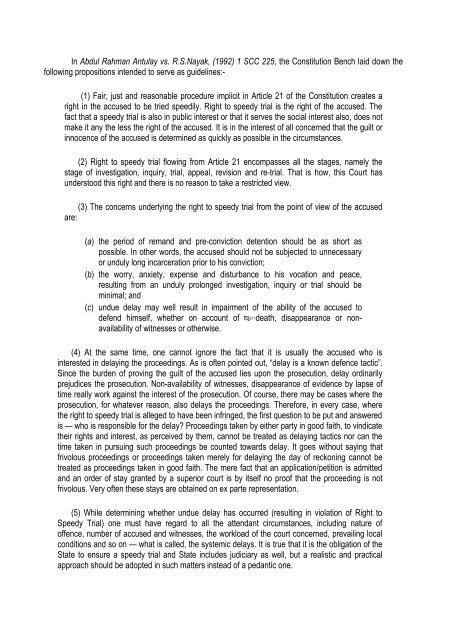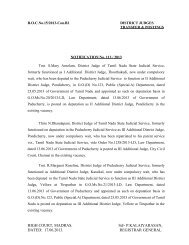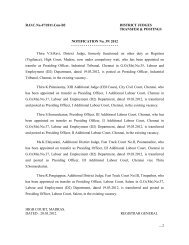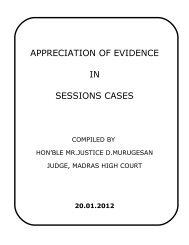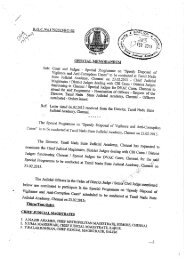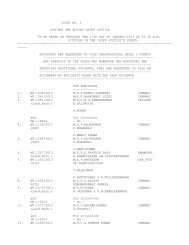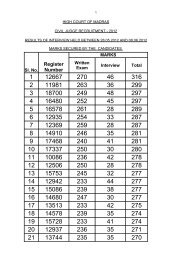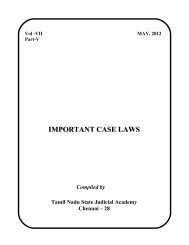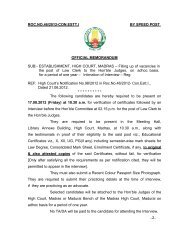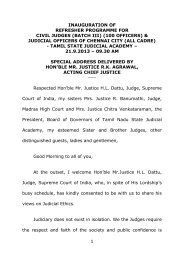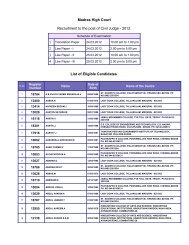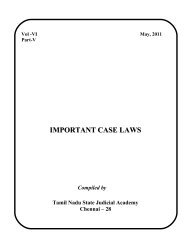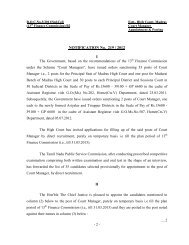Role of Prisoners and Convicts under the Criminal Justice ...
Role of Prisoners and Convicts under the Criminal Justice ...
Role of Prisoners and Convicts under the Criminal Justice ...
You also want an ePaper? Increase the reach of your titles
YUMPU automatically turns print PDFs into web optimized ePapers that Google loves.
In Abdul Rahman Antulay vs. R.S.Nayak, (1992) 1 SCC 225, <strong>the</strong> Constitution Bench laid down <strong>the</strong><br />
following propositions intended to serve as guidelines:-<br />
(1) Fair, just <strong>and</strong> reasonable procedure implicit in Article 21 <strong>of</strong> <strong>the</strong> Constitution creates a<br />
right in <strong>the</strong> accused to be tried speedily. Right to speedy trial is <strong>the</strong> right <strong>of</strong> <strong>the</strong> accused. The<br />
fact that a speedy trial is also in public interest or that it serves <strong>the</strong> social interest also, does not<br />
make it any <strong>the</strong> less <strong>the</strong> right <strong>of</strong> <strong>the</strong> accused. It is in <strong>the</strong> interest <strong>of</strong> all concerned that <strong>the</strong> guilt or<br />
innocence <strong>of</strong> <strong>the</strong> accused is determined as quickly as possible in <strong>the</strong> circumstances.<br />
(2) Right to speedy trial flowing from Article 21 encompasses all <strong>the</strong> stages, namely <strong>the</strong><br />
stage <strong>of</strong> investigation, inquiry, trial, appeal, revision <strong>and</strong> re-trial. That is how, this Court has<br />
<strong>under</strong>stood this right <strong>and</strong> <strong>the</strong>re is no reason to take a restricted view.<br />
(3) The concerns <strong>under</strong>lying <strong>the</strong> right to speedy trial from <strong>the</strong> point <strong>of</strong> view <strong>of</strong> <strong>the</strong> accused<br />
are:<br />
(a) <strong>the</strong> period <strong>of</strong> rem<strong>and</strong> <strong>and</strong> pre-conviction detention should be as short as<br />
possible. In o<strong>the</strong>r words, <strong>the</strong> accused should not be subjected to unnecessary<br />
or unduly long incarceration prior to his conviction;<br />
(b) <strong>the</strong> worry, anxiety, expense <strong>and</strong> disturbance to his vocation <strong>and</strong> peace,<br />
resulting from an unduly prolonged investigation, inquiry or trial should be<br />
minimal; <strong>and</strong><br />
(c) undue delay may well result in impairment <strong>of</strong> <strong>the</strong> ability <strong>of</strong> <strong>the</strong> accused to<br />
defend himself, whe<strong>the</strong>r on account <strong>of</strong> death, disappearance or nonavailability<br />
<strong>of</strong> witnesses or o<strong>the</strong>rwise.<br />
(4) At <strong>the</strong> same time, one cannot ignore <strong>the</strong> fact that it is usually <strong>the</strong> accused who is<br />
interested in delaying <strong>the</strong> proceedings. As is <strong>of</strong>ten pointed out, “delay is a known defence tactic”.<br />
Since <strong>the</strong> burden <strong>of</strong> proving <strong>the</strong> guilt <strong>of</strong> <strong>the</strong> accused lies upon <strong>the</strong> prosecution, delay ordinarily<br />
prejudices <strong>the</strong> prosecution. Non-availability <strong>of</strong> witnesses, disappearance <strong>of</strong> evidence by lapse <strong>of</strong><br />
time really work against <strong>the</strong> interest <strong>of</strong> <strong>the</strong> prosecution. Of course, <strong>the</strong>re may be cases where <strong>the</strong><br />
prosecution, for whatever reason, also delays <strong>the</strong> proceedings. Therefore, in every case, where<br />
<strong>the</strong> right to speedy trial is alleged to have been infringed, <strong>the</strong> first question to be put <strong>and</strong> answered<br />
is — who is responsible for <strong>the</strong> delay? Proceedings taken by ei<strong>the</strong>r party in good faith, to vindicate<br />
<strong>the</strong>ir rights <strong>and</strong> interest, as perceived by <strong>the</strong>m, cannot be treated as delaying tactics nor can <strong>the</strong><br />
time taken in pursuing such proceedings be counted towards delay. It goes without saying that<br />
frivolous proceedings or proceedings taken merely for delaying <strong>the</strong> day <strong>of</strong> reckoning cannot be<br />
treated as proceedings taken in good faith. The mere fact that an application/petition is admitted<br />
<strong>and</strong> an order <strong>of</strong> stay granted by a superior court is by itself no pro<strong>of</strong> that <strong>the</strong> proceeding is not<br />
frivolous. Very <strong>of</strong>ten <strong>the</strong>se stays are obtained on ex parte representation.<br />
(5) While determining whe<strong>the</strong>r undue delay has occurred (resulting in violation <strong>of</strong> Right to<br />
Speedy Trial) one must have regard to all <strong>the</strong> attendant circumstances, including nature <strong>of</strong><br />
<strong>of</strong>fence, number <strong>of</strong> accused <strong>and</strong> witnesses, <strong>the</strong> workload <strong>of</strong> <strong>the</strong> court concerned, prevailing local<br />
conditions <strong>and</strong> so on — what is called, <strong>the</strong> systemic delays. It is true that it is <strong>the</strong> obligation <strong>of</strong> <strong>the</strong><br />
State to ensure a speedy trial <strong>and</strong> State includes judiciary as well, but a realistic <strong>and</strong> practical<br />
approach should be adopted in such matters instead <strong>of</strong> a pedantic one.


